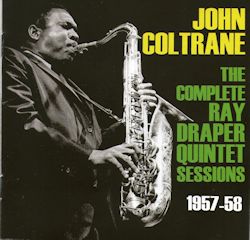1. Cliffordís Kappa
2. Filidia
3. Two sons
4. Paulís pal
5. Under Paris skies
6. I hadnít anyone till you
John Coltrane (tenor sax)
Ray Draper (tuba)
Gil Coggins (piano)
Spanky De Brest (bass)
Larry Richie (drums)
Englewood Cliffs, New Jersey, USA on December 20, 1957. Originally issued on The Ray Draper Quintet featuring John Coltrane, New Jazz NJ-8228
7. Essiiís dance
8. Doxy
9. Oleo
10. I talk to the trees
11. Yesterdays
12. Angel eyes
John Coltrane (tenor sax)
Ray Draper (tuba)
John Mayer (piano)
Spanky De Brest (bass)
Larry Richie (drums)
New York, USA in November, 1958. Originally issued on Ray Draper: A Tuba Jazz, Jubilee JLP 1090
ACROBAT MUSIC ACMCD4375
[76:36]
Itís records such as this that serve to emphasise that while you may think you know a subject fairly well there are all sorts of elements that slip past
you unnoticed. One thing that this disc has taught me is that the tuba has always had a place in jazz from the earliest times. I could imagine that in
respect of the Dixieland jazz bands of the early 1900s but I was surprised to learn that it also found its way into hard bop as witnessed on this disc. Ray
Draper emerged from the Manhattan School of Music determined to become a hard bop jazz tubist and amazingly the first of the two albums here was recorded
with him as leader at the tender age of 17 (the first was when he only 16!). However, for me what emerges is quite a weird experience since the tuba, while
apparently not unique in jazz is, letís face it, a somewhat unlikely instrument to hear in this kind of setting. In the main it seems to me to have to wait
for its own spot rather than play alongside Coltraneís horn because it cannot compete with the speed of playing of the tenorist or on the few occasions it
does share the playing everything has to slow down to accommodate it. Of course in 4 of the numbers written by Draper the space was created by the
composer. It is a little more difficult to shoehorn such a big instrument into standards and means that the tune simply gives way while Ray shines for a
short interval, for example before Coltrane and Gil Coggins take their solos on Under Paris Skies.
I donít want to appear picky because I recognise the musicianship on display and the sheer earthy determination that Ray Draper shows in sharing his love
for his instrument with other jazz lovers. However, in the end this disc is an oddity that I enjoy mainly because it gives me another chance to revel in my
all-time jazz hero the great Trane who I never tire of hearing. There are many opportunities here for just that and his solos are fabulous, as they always
are. Two of the Sonny Rollins tunes are unavailable in any other of his recordings so in many ways this disc is a wonderful addition to jazz discography
and for those who are already fans of the jazz tuba the disc is obviously an absolute must have.
I feel a little uncomfortable making any kind of criticism of the tuba in jazz having learned that this fine musician died in the most horrendously bizarre
incident being shot by a thirteen year old mugger even though heíd already handed over his money after being held up emerging from a bank. For such a thing
to happen to someone with such promise at the ridiculously early age of 42 is tragic to say the least.
Steve Arloff
